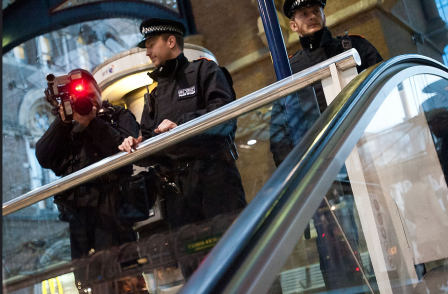
 Times journalist Jules Mattsson is one of six members of the NUJ to launch a legal challenge against the Metropolitan Police after finding that it keeps surveillance files on them in a database of Domestic Extremism.
Times journalist Jules Mattsson is one of six members of the NUJ to launch a legal challenge against the Metropolitan Police after finding that it keeps surveillance files on them in a database of Domestic Extremism.
Finding out you’re on a secret police database is very unsettling.
After six months of trying to obtain the Met Police files on me, and one bundle of sensitive personal data being sent to the wrong address, I finally managed to get everything from the Metropolitan Police that they were willing to give. I have no way of knowing, of course, if they hold more that they’ve refused to hand over.
“He has previously recorded police officers … this needs to be borne in mind when dealing with Mr MATTSSON”, is one flavour of the sort of intelligence the force thought it necessary to hold on me – with notes about me recording police a running theme throughout.
With forces starting to use body-mounted cameras themselves – why, in my ‘extremism’ file, are counter-terror cops worried by the fact I’ve overtly pulled out a dictaphone once or twice during discussions on the job?
When you later find out that an officer who interviewed you when you were a victim of crime was actually writing a report about you for a database, as I did, it really shakes your trust in being able to report things to the police.
Notes over my use of recording equipment and some tweets (yes they were watching me on Twitter) isn’t all that cops have decided they need to keep on me. They've also kept data about:
- my "pocket litter" found during a search
- sexual orientation
- known/past addresses
- phone numbers
- some old freelance clients
- any time I’ve been a crime victim/witness
- my childhood
- college
- father’s work
- and a family member’s medical history from an unknown source recorded for no clear reason.
Once information is on the police database, however wrong it may be, it becomes fact in the eyes of other officers. Among the information disclosed to me was a powerpoint slide with my name, a massive (unflattering) photo of my face and some info cribbed from the database. We don’t know where or why it was presented, presumably some sort of briefing, but I doubt the officers were viewing its claims with scepticism.
And so it goes?—?one thing becomes an opinion on my character, then a pattern, then errors and total falsehoods are added, it all becomes solid self-perpetuating fact and eventually becomes packaged intel in a powerpoint. They don’t tell you you’re on the database so you have no way of challenging or correcting it all unless you engage in a time-consuming legal procedure like this.
Press freedoms are hard fought and under threat. The Bureau of Investigative Journalism is launching a broad European Court Action to stop law enforcement viewing the emails and call records of journalists and their sources, more than 1,000 have signed Press Gazette's petition on the same issue and the Interception Commissioner is carrying out an inquiry. It’s a challenging time for the free press and we have push back.
I feel this sort of behaviour by the police is completely at odds with our values as a society and undermines good police work from hard-working officers. I am making this challenge to force the Met to stop keeping files on the press and to make sure this doesn’t happen again.
PIC: by Jules Mattsson, showing police filming him.
Email pged@pressgazette.co.uk to point out mistakes, provide story tips or send in a letter for publication on our "Letters Page" blog

